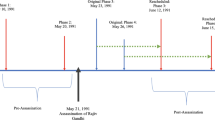Abstract
This paper develops a Federal Reserve reaction function which relates policy intentions to forecasts of policy objectives. Pre- and postpresidential election estimates of this reaction function for the post-Accord period of 1953–1984 suggest two conclusions:
-
(1)
the Federal Reserve reacts differently to economic conditions in the pre- and postelection biennia and
-
(2)
these differences in Fed behavior are not likely the result of partisan political influence, but rather the result of self-restraint by the Fed during preelection periods.
Similar content being viewed by others
References
Abrams, R.K., Froyen, R., and Waud, R.N. (1980). Monetary reaction functions, consistent expectations, and the Burns era. Journal of Money, Credit and Banking 12 (February): 30–42.
Allen, S.D. (1986). The Federal Reserve and the electoral cycle. Journal of Money, Credit and Banking 18 (February): 88–94.
Amemiya, T. (1981). Qualitative response models: A survey. Journal of Economic Literature 19 (December): 1483–1536.
Barth, J., Sickles, R., and Weist, P. (1982). Assessing the impact of varying economic conditions on Federal Reserve behavior. Journal of Macroeconomics 4 (Winter): 47–70.
Bradley, M.D., and Jansen, D.W. (1986). Federal Reserve operating procedure in the eighties: A dynamic analysis. Journal of Money, Credit and Banking 18 (August): 323–335.
Froyen, R.T. (1974). A test of the endogeneity of monetary policy. Journal of Econometrics 2 (July): 175–188.
Fuller, W.A. (1976). Introduction to statistical time series. New York: Wiley.
Havrilesky, T. (1967). A test of monetary policy actions. Journal of Political Economy 75 (June): 299–304.
Ladd, G.W. (1966). Linear probability functions and discriminant functions. Econometrica 34 (October): 873–885.
Laney, L.O., and Willett, T.D. (1983). Presidential politics, budget deficits, and monetary policy in the United States; 1960–1976. Public Choice 40 (1): 53–70.
Luckett, D.G., and Potts, G.T. (1980). Monetary policy and partisan politics. Journal of Money, Credit and Banking 12 (August): 540–546.
McCallum, B.T. (1976). Rational expectations and the natural rate hypothesis: Some consistent estimates. Econometrica 44 (January): 43–52.
Potts, G.T., and Luckett, D.G. (1978). Policy objectives of the Federal Reserve system. The Quarterly Journal of Economics 92 (August): 525–534.
Rasche, R.H. (1985). Interest rate volatility and alternative monetary control procedures. Federal Reserve Bank of San Francisco Economic Review (Summer): 46–63.
Richards, D.J. (1986). Unanticipated money and the political business cycle. Journal of Money, Credit and Banking 18 (November): 447–457.
Sargent, T.J. (1979). Estimating vector autoregressions using methods not based on explicit economic theories. Federal Reserve Bank of Minneapolis Quarterly Review (Summer): 8–15.
Wallace, M.S., and Warner, J.T. (1984). Fed policy and presidential elections. Journal of Macroeconomics 6 (Winter): 79–88.
Author information
Authors and Affiliations
Additional information
I would like to thank Professor Dudley Luckett and Brian Gibson for helpful comments. I would also like to thank Myles Wallace and John Warner for providing the policy classifications.
Rights and permissions
About this article
Cite this article
Hakes, D.R. Monetary policy and presidential elections: A nonpartisan political cycle. Public Choice 57, 175–182 (1988). https://doi.org/10.1007/BF00052404
Issue Date:
DOI: https://doi.org/10.1007/BF00052404




